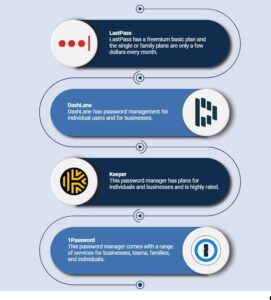Its true to say that nobody likes Passwords. To ease the pain and frustration why not use a Password Manager?
Remembering login details for numerous websites and services, especially when there are over a hundred, is a nasty task. It’s practically impossible to memorise such a large number of unique credentials, which in turn creates various security issues (we’ll delve into them shortly).
Fortunately, new technologies are emerging or already exist that either eliminate the need for passwords altogether or incorporate additional layers of security. However, these innovative features such as passkeys, single sign-on, and passwordless authentication have their own challenges and are not yet universally available for all the systems, services, and accounts that currently require passwords.
One day, in the not so distance future, passwords will not be necessary. But we haven’t got there yet.
Password Managers serve as the most effective and widely applicable solution for addressing the security and accessibility challenges posed by passwords.
This article focuses on Password Managers, highlighting the reasons why you need one, the potential risks faced by individuals and organisations that fail to address poor password practices, and recommendations for password managers that are worth considering.
The Risks
As mentioned earlier, passwords can be a source of frustration. They are difficult for humans to remember and susceptible to being guessed by machines. Moreover, it’s practically impossible for anyone to remember a large number of username and password combinations. Consequently, users often resort to unsafe shortcuts to overcome this challenge.
Some people resort to writing down their passwords in a notebook or keeping them on sticky notes under their keyboards. However, this approach poses a significant risk since anyone with physical access to the space can easily steal all the passwords. A single snapshot taken with a smartphone camera can compromise every listed account.
Others opt to create one or two easily memorable passwords and reuse them across multiple sites and systems. Despite the awareness that this practice is dangerous, as indicated by around 90 percent of respondents in a survey, nearly 65 percent still admit to doing it.
The problem with this approach is that if criminals manage to obtain your username and password from any source, such as a data breach or phishing attack, they now have access to your password across all platforms, including sensitive accounts like your bank and work logins. The situation becomes even worse when email addresses are reused as usernames.
When it comes to your security, it’s essential not to be complacent.
The Solution
A password manager can store all of your passwords and create long, complicated passwords and store them so that you don’t have to remember any of the information. All you need to remember is the main password for the manager itself.
Your password manager does the rest. And it’s actually more secure because the password manager is making up passwords that have nothing to do with the user personally.
One of the top ways hackers access passwords is by using social engineering to “guess” at possible scenarios. It’s not possible when the passwords are auto generated.
There are some great password managers on the market. Some are free and others have paid services, so you should do your own research on the offerings to make sure they have the plans that work for you. Here are a few of the popular ones on the market:

There are a lot of password managers to choose from and any of them would be better than reusing passwords or using easily guessed passwords.
It’s definitely easier than having to reset your password every time you forget one. Which, let’s be honest, you’re probably doing at least a few times every week.
Do you need any help to choose a password manager for your organisation?
Why not schedule a 15-minute no-obligation conversation with our team today to see how we can help.
Not ready to make the call? Find out more tip top tips on how to keep safe online from our recent articles:
Phishing: Spot it, Report it, Delete it
5 Cyber Security Mistakes That Are Easily Preventable
Six Everyday Objects That Can Be Used for Identity Theft
Have you heard of Push-Bombing? Here’s how to prevent it….


